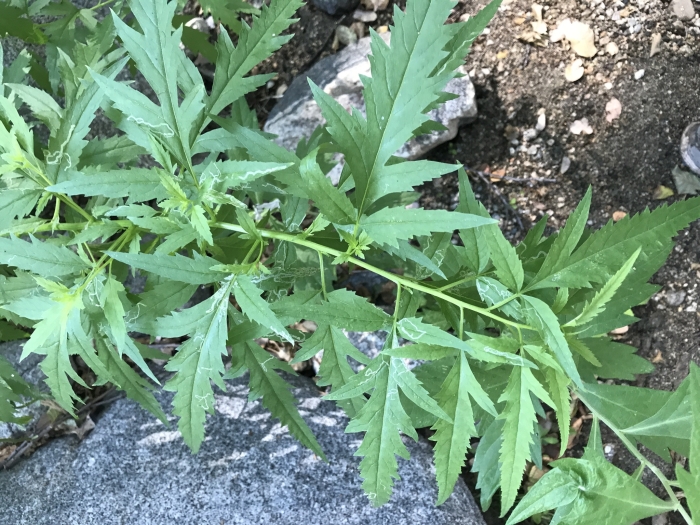Durango Root
(Datisca glomerata)
Durango Root (Datisca glomerata)
/
/

© Emily Chebul
CC BY-SA 4.0
Image By:
© Emily Chebul
Recorded By:
Copyright:
CC BY-SA 4.0
Copyright Notice:
Photo by: © Emily Chebul | License Type: CC BY-SA 4.0 | License URL: http://creativecommons.org/licenses/by-sa/4.0/ | Uploader: emilychebul | Publisher: iNaturalist |
























Estimated Native Range
Summary
Datisca glomerata, commonly known as Durango root, is a perennial herb native to the chaparral and oak woodlands of California, the Great Basin deserts of Nevada, and the northern parts of Baja California. It typically grows to a height of 3-6 feet (0.9-1.8 meters) and has a similar spread. Datisca glomerata is characterized by its erect form, long, pointed leaves, and yellowish-green flowers that appear in dense, branched clusters from late spring to early summer. The flowers are not particularly showy, but they do add a subtle charm to the plant’s overall appearance. The plant’s resemblance to Cannabis species is notable, although they are not related.
Durango root is not commonly cultivated in gardens due to its toxicity; however, it is of interest for its unique androdioecious breeding system, which is rare in the plant kingdom. It is sometimes used in naturalistic plantings and restoration projects within its native range. In cultivation, it requires well-drained soils and can tolerate drought conditions once established, preferring full sun to part shade. There are no popular garden cultivars of this species due to its toxic nature and limited horticultural use. Gardeners should be aware that Durango root is considered toxic and has been reported to be poisonous to cattle. Its toxicity should be considered when planting in areas accessible to livestock or pets.CC BY-SA 4.0
Durango root is not commonly cultivated in gardens due to its toxicity; however, it is of interest for its unique androdioecious breeding system, which is rare in the plant kingdom. It is sometimes used in naturalistic plantings and restoration projects within its native range. In cultivation, it requires well-drained soils and can tolerate drought conditions once established, preferring full sun to part shade. There are no popular garden cultivars of this species due to its toxic nature and limited horticultural use. Gardeners should be aware that Durango root is considered toxic and has been reported to be poisonous to cattle. Its toxicity should be considered when planting in areas accessible to livestock or pets.CC BY-SA 4.0
Plant Description
- Plant Type: Herb, Shrub
- Height: 3-6 feet
- Width: 2-4 feet
- Growth Rate: Moderate
- Flower Color: Green, Yellow
- Flowering Season: Spring, Summer
- Leaf Retention: Deciduous
Growth Requirements
- Sun: Full Sun
- Water: Medium
- Drainage: Medium, Fast
Common Uses
Bee Garden, Butterfly Garden, Deer Resistant, Drought Tolerant, Erosion Control, Low Maintenance
Natural Habitat
Native to chaparral and oak woodlands of California, the Great Basin deserts of Nevada, and northern Baja California
Other Names
Common Names: Indian Hemp, False Hemp
Scientific Names: , Datisca glomerata, Cannabina glomerata, Datisca glomerata, Tricerastes glomerata,
GBIF Accepted Name: